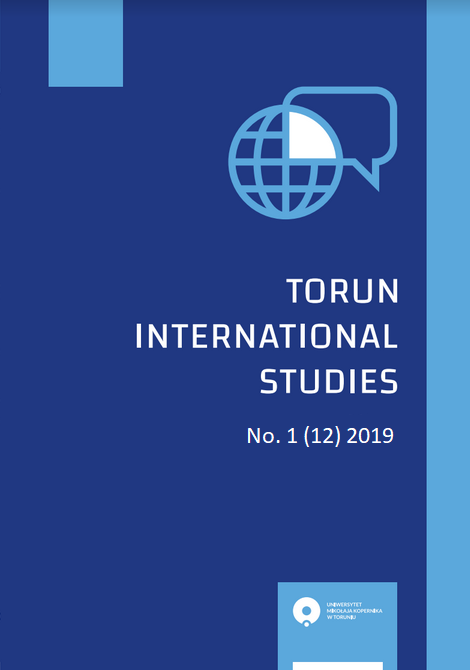POLITICAL COMMUNICATION DISCORD BETWEEN THE GOVERNMENT AND THE CITIZENS: THE CASE OF UKRAINE
DOI:
https://doi.org/10.12775/TIS.2019.010Keywords
state autrhority, civil society, communication policy, communication discord model, decision-making processAbstract
Political communication is a major factor in the democratisation of power relations, since the latter are based on public policy, ensuring a constant interconnection between political actors at all levels. Through political communication, it is possible to overcome the contradictions that complicate the democratisation of society. The article is a critical examination of the present-day communication interaction between the citizens and the government of Ukraine. The term developed here to describe this phenomenon is the communication discord between the citizens and the government provoked by the heterogeneity of interests and goals of society and factors associated with the activity of the government. Communication policy of the government is aimed at involving citizens in the decision-making process while communication activity of the citizens is oriented on the formation of public opinion, the exchange of ideas and arguments and, later on, on the influence on the government and the decision-making process. The distinction of these two communication processes is also facilitated by the tendency of mediatisation of communications in the modern world, related to technical development, the Internet and social media. Models of the communication interaction between the government and society are researched. Recommendations to improve the political communication of Ukraine’s Government are developed.
References
Cabinet of Ministers of Ukraine. (2013). The government has issued a decree to suspend the process of preparation for the conclusion of the Association Agreement with the EU. Retriveed August 12, 2019, from http://old.kmu.gov.ua/kmu/control/uk/publish/article?art_id=246864953&cat_id=248439752. (in Ukrainian)
Castells, M. (2009). Communication Power. New York: Oxford University Press Inc.
Civil Society and the Authority. (2008). Secretariat of the Cabinet of Ministers of Ukraine. Retrived June 10, 2019, from http://civic.kmu.gov.ua. (in Ukrainian)
Commission of the European Communities. (2006). White Paper on a European Communication Policy. Retrieved August 20, 2019, from http://europa.eu/documents/comm/white_papers/pdf/com2006_35_en.pdf.
Goban-Klas, T. (2011). Wartki nurt medi´ow. Ku nowym formom społecznego zycia informacji. Pisma z lat 2000–2011. Krakow: TA/WPN Universitas.
Habermas, J. (1996). Between facts and norms: Contributions to a discourse theory of law and democracy. Cambridge: Polity Press.
Hallin, D. C., & Mancini, P. (2004). Comparing Media Systems: Three Models of Media and Politics. Cambridge: Cambridge University Press.
Kravets, R. (2019, November 6). How the Goncharuk government works. Who is whose minister, closed Cabinet session and rotation threats. Ukrayins’ka pravda. Retrieved December 26, 2019, from https://www.pravda.com.ua/articles/2019/11/6/7231108/ (in Ukrainian)
Lelleker, D. J. (2014). Political Communication and Cognition. London: Palgrave Macmillan.
Lubetkin, M. (2011). Civil Society and the Need to Communicate with Impact. Retrieved August 8, 2019, from https://www.civicus.org/index.php/media-resources/news/1375-civil-society-and-the-need-to-communicate-with-impact.
Luhmann, N. (1981). The improbability of communication. International Social Science Journal, 1, Vol. XXXIII, 122–133.
Merriam-Webster Dictionary. (2019). Definition of discord. Retrieved November 10, 2019, from https://www.merriam-webster.com/dictionary/discord.
Open City. (2016). Strengthening Citizens’ Participation in a Local Community Development. East Europe Foundation. Retrieved July 17, 2019, from http://eef.org.ua/programi/efektivne-upravlinnya-ta-gromadyansk/vidkryte-misto/. (in Ukrainian)
Open Government Partnership. (2011). Cabinet of Ministers of Ukraine. Retrieved July 17, 2019, from https://www.kmu.gov.ua/ua/gromadskosti/gromadyanske-suspilstvo-i-vlada/partnerstvo-vidkritij-uryad. (in Ukrainian)
Pipchenko, N. (2014). Social Media in the Structure of Foreign Policy of Leading International Actors. Kyiv: Tsentr Vilnoyi Presy. (in Ukrainian)
Romanenko, Ye. (2014). Models of the Communication Policy of a State and Instruments Support of the Interaction of the State Authority Bodies and the Public Democratic governance. Academic papers collection, Issue 14 “Democratic Governannce”. Retrived July 16, 2019, from http://lvivacademy.com/vidavnitstvo_1/visnyk14/fail/romanenko.pdf. (in Ukrainian)
Siebert, F.T., Peterson, Th.B., & Schramm, W. (1956). Four Theories of the Press: The Authoritarian, Libertarian, Social Responsibility, and Soviet Communist Concepts of What the Press Should Be and Do. Chicago: University of Illinois Press.
Stromeyer, G. (2008). Politics and the Media. Kyiv: Kyiv-Mohyla Academy Publishing House. (in Ukrainian)
Sungurov, A. (2009). Models of Interaction of State Authority Bodies and Civil Society Structures: Russian Experience. Retrieved August 12, 2019, from https://www.civisbook.ru/files/File/Sungurov_modeli.pdf. (in Russian)
UNIAN. (2015). Rada introduced electronic petitions for citizens’ appeals. Retrived July 17, 2019, from http://www.unian.ua/politics/1096102-rada-vvela-elektronni-petitsiji-dlya-zvernen-gromadyan.html. (in Ukrainian)
Verkhovna Rada of Ukraine. (2010). On Ensuring Public Participation in the Formation and Implementation of State Policy.. Retrieved August 12, 2019, from https://zakon4.rada.gov.ua/laws/show/996-2010-%D0%BF. (in Ukrainian)
Vocabulary com. Dictionary. (2019). Discord. Retrieved November 10, 2019, from https://www.vocabulary.com/dictionary/discord.
Webster, F. (1995). Theories of the Information Society. New York: Routledge.
Downloads
Published
How to Cite
Issue
Section
Stats
Number of views and downloads: 570
Number of citations: 0



